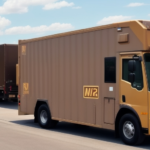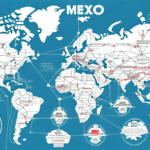Discovering the Best Freight Shipping Rates with UPS
When it comes to shipping freight, finding the most competitive rates and reliable service is crucial for ensuring cost-effective and timely delivery. UPS stands as a trusted leader in the freight shipping industry, offering a variety of shipping options and rates tailored to meet the diverse needs of businesses and individuals alike. This article delves into the key factors to consider when seeking the best freight shipping rates with UPS and provides actionable strategies to help you save money on your shipments.
Understanding the Basics of Freight Shipping
Freight shipping involves the transportation of large or heavy items, such as machinery, equipment, and bulk goods. Unlike parcel shipping, which typically handles lightweight items and small packages, freight shipping requires a more complex process and specialized handling, including palletizing, crating, and securing cargo for transportation. Depending on the type and volume of the shipment, businesses can choose from various freight shipping options offered by carriers like UPS, including LTL (Less Than Truckload), FTL (Full Truckload), air freight, and ocean freight.
One of the primary considerations when selecting a freight shipping option is cost. LTL shipping is often more cost-effective for smaller shipments, while FTL shipping may be more economical for larger volumes. Air freight, while being the fastest option, is typically the most expensive, whereas ocean freight is slower but can be more cost-effective for international shipments.
Additionally, the type of cargo being shipped plays a significant role in determining the appropriate shipping method. Items requiring special handling, such as refrigeration or hazardous materials, necessitate carriers with the expertise and equipment to ensure safe and compliant transportation.
Factors Affecting Freight Shipping Rates
The cost of freight shipping with UPS is influenced by several factors, including:
- Distance: The origin and destination of the shipment significantly impact the total cost. Longer distances generally incur higher rates due to increased fuel and labor costs.
- Weight and Dimensions: Heavier and larger shipments cost more to transport. UPS utilizes dimensional weight pricing to account for both size and weight.
- Shipping Service: The chosen service level, such as express or standard, affects the rate. Faster services like UPS Next Day Air Freight are more expensive than standard options.
- Mode of Transportation: Different transportation modes, such as air, ground, or sea, come with varying costs and delivery times.
- Seasonality: Peak shipping seasons, holidays, and high-demand periods can lead to increased rates.
- Fuel Surcharges and Accessorial Fees: Additional charges for fuel, residential deliveries, liftgate services, and other special requirements can add to the overall cost.
- Type of Goods: Specialized goods like hazardous materials or perishable items may incur extra fees due to the need for special handling and compliance with regulations.
Understanding these factors can help businesses make informed decisions and optimize their shipping strategies to reduce costs.
How UPS Calculates Freight Shipping Rates
UPS employs a sophisticated algorithm to determine freight shipping rates, considering the various factors mentioned above. One of the primary tools used is the UPS Freight Density Calculator, which assesses the density of a shipment based on its weight and dimensions. Higher density shipments typically result in lower rates per unit weight.
UPS also offers the UPS Freight Rating Tool and the UPS Zone Guide to help businesses estimate shipping costs accurately. These tools take into account the shipment's origin and destination zones, providing a clear breakdown of expected rates.
Furthermore, UPS considers the mode of transportation and the distance traveled. For instance, air freight is generally more expensive than ground transportation due to faster delivery times and higher operational costs. Longer distances also result in higher rates due to increased fuel consumption and labor requirements.
Specialized shipments, such as those involving hazardous materials or oversized items, require additional handling and compliance with safety regulations, which UPS factors into the overall shipping cost. UPS offers tailored services for these types of shipments, ensuring they are transported safely and in accordance with industry standards.
Finding the Right UPS Service for Your Freight Needs
Selecting the appropriate UPS service for your freight needs involves evaluating several factors, including the shipment's size, weight, delivery urgency, and budget. UPS provides a range of freight shipping services designed to accommodate various requirements:
- UPS Next Day Air Freight: Ideal for urgent shipments requiring next-day delivery.
- UPS Ground Freight: Suitable for standard deliveries with cost-effective rates.
- UPS Worldwide Express Freight: Designed for international shipments requiring rapid delivery.
Additionally, UPS offers a variety of accessorial services to customize shipments, such as:
- Liftgate Service: Assists in loading and unloading shipments in areas without a loading dock.
- Inside Delivery: Ensures the shipment is delivered inside the recipient’s facility.
- Hazardous Materials Handling: Provides specialized handling for dangerous goods.
Another critical aspect is the level of tracking and visibility offered by UPS. With real-time tracking through the UPS Tracking Tool, businesses can monitor their shipments' progress, ensuring they stay informed about their delivery status at all times. This feature is particularly beneficial for time-sensitive or high-value shipments, allowing for proactive management and prompt resolution of any issues that may arise.
Customer support is another vital consideration. UPS provides dedicated customer service representatives to assist businesses throughout the shipping process, from selecting the appropriate service to addressing any concerns or issues that may occur during transit. This support ensures a smooth and hassle-free shipping experience.
Tips for Saving Money on Freight Shipping with UPS
Freight shipping can represent a significant expense for businesses, especially those that ship frequently or in large volumes. However, several strategies can help businesses reduce their shipping costs with UPS:
- Consolidate Shipments: Combining multiple shipments into a single truckload can qualify for better rates and reduce overall transportation costs.
- Negotiate Rates: Businesses with high shipping volumes can negotiate discounted rates with UPS, leveraging their shipping frequency to secure better deals.
- Optimize Packaging: Efficient packaging that reduces the size and weight of shipments can lower shipping costs. Utilizing UPS's packaging guidelines can help ensure shipments are optimized for cost and safety.
- Use Online Shipping Tools: Leveraging UPS’s online tools, such as UPS Internet Shipping, can provide access to discounted rates and eliminate manual processing fees.
- Schedule Shipments Strategically: Planning shipments during non-peak times can help avoid higher rates associated with peak shipping seasons and holidays.
Implementing these strategies can lead to substantial savings on freight shipping costs while maintaining reliable and efficient delivery services.
Comparing UPS Freight Rates to Other Carriers
Choosing the most cost-effective freight shipping option often involves comparing UPS rates with those of other major carriers such as FedEx, DHL, and USPS. Each carrier has its strengths and pricing structures, making it essential to evaluate them based on specific shipping needs:
- FedEx: Known for its extensive global network and reliable express services, FedEx may offer competitive rates for time-sensitive international shipments.
- DHL: Specializes in international shipping with a strong presence in Europe and Asia, often providing competitive rates for global freight.
- USPS: While primarily focused on smaller packages, USPS can be a cost-effective option for certain types of shipments, especially within the United States.
Businesses should consider factors such as delivery speed, reliability, coverage areas, and additional services when comparing carriers. Utilizing comparison tools and obtaining quotes from multiple carriers can help identify the most cost-effective and suitable shipping option for specific needs.
Understanding Additional Fees and Surcharges in Freight Shipping
In addition to base shipping rates, freight shipments may incur various additional fees and surcharges. Being aware of these potential costs is crucial for accurate budgeting and avoiding unexpected expenses:
- Fuel Surcharges: Reflect fluctuations in fuel prices and are applied as a percentage of the base rate.
- Residential Delivery Fees: Charged when delivering to a residential address rather than a commercial location.
- Liftgate Fees: Applied when a liftgate is required for loading or unloading in areas without a loading dock.
- Inside Delivery Fees: Incurred when shipments need to be delivered inside a building rather than at the loading dock.
- Hazardous Materials Fees: Additional charges for shipping hazardous or dangerous goods that require special handling.
UPS provides detailed resources and guides to help businesses understand and manage these fees effectively. Reviewing the UPS Surcharges Guide can provide clarity on applicable fees and how to minimize their impact on overall shipping costs.
Navigating the UPS Freight Shipping Process
The freight shipping process with UPS involves several key steps designed to ensure a smooth and efficient experience:
- Preparing the Shipment: Properly package and label your freight according to UPS guidelines to ensure safe transportation and compliance with regulations.
- Scheduling the Pickup: Use UPS’s online tools or contact customer service to schedule a convenient pickup time for your shipment.
- Tracking the Shipment: Monitor your shipment in real-time using the UPS Tracking Tool or UPS Quantum View Manage for enhanced visibility and proactive management.
- Arranging for Delivery: Coordinate delivery details, including specific delivery instructions and accessorial services, to ensure timely and accurate receipt of your shipment.
Utilizing UPS’s comprehensive tools and resources, such as the UPS Freight Bill of Lading and the UPS Quantum View Manage, can streamline the shipping process, reduce errors, and enhance overall efficiency.
Avoiding Common Mistakes in Freight Shipping with UPS
Freight shipping can be complex, and avoiding common mistakes is essential for ensuring successful and cost-effective deliveries. Here are some common pitfalls to watch out for:
- Inaccurate Weight and Dimension Measurements: Ensuring precise measurements is crucial for accurate pricing and avoiding additional charges.
- Mislabeling or Incorrect Documentation: Properly labeling shipments and completing all necessary documentation prevents delays and compliance issues.
- Inadequate Packaging or Palletizing: Using appropriate packaging materials and techniques protects your goods and reduces the risk of damage during transit.
- Failing to Consider Surcharges and Fees: Being aware of additional costs helps in budgeting accurately and avoiding unexpected expenses.
UPS offers extensive guidance and support to help businesses navigate these challenges. Utilizing resources like the UPS Packaging Advisor can aid in proper packaging, while consulting with UPS customer service can clarify documentation requirements and fee structures.
Tracking Your Shipment with UPS
One of the standout features of shipping with UPS is the ability to track your shipment in real-time from pickup to delivery. UPS provides a range of tracking tools and services to enhance visibility and control:
- UPS Tracking Tool: Allows businesses to monitor the status of their shipments online, providing updates at each stage of the delivery process.
- UPS My Choice: Offers advanced tracking features, including delivery alerts and the ability to manage delivery preferences via email, text, or phone notifications.
- UPS Quantum View: Provides comprehensive visibility into all incoming and outgoing shipments, enabling proactive management and exception handling.
These tracking capabilities ensure that businesses remain informed about their shipments' progress, allowing for timely interventions in case of delays or issues. This level of transparency is particularly beneficial for high-value or time-sensitive shipments, where knowing the exact status can influence operational decisions and customer communications.
Managing Your Shipping Costs with UPS
Shipping costs can significantly impact a business's bottom line, especially for those relying on regular or high-volume shipments. Effective management of these costs involves several strategies:
- Analyze and Optimize Shipping Patterns: Review your shipping data to identify opportunities for consolidation, route optimization, and service level adjustments to reduce costs.
- Negotiate Rates: Engage with UPS to negotiate better rates based on your shipping volume, leveraging your business's shipping frequency to secure discounts.
- Utilize UPS Shipping Tools: Implement tools like UPS CampusShip and WorldShip to automate and streamline your shipping processes, reducing manual processing costs and minimizing errors.
- Take Advantage of Discounts and Promotions: Participate in programs like the UPS Small Business Program to benefit from significant discounts on various services.
By implementing these strategies, businesses can effectively manage and reduce their shipping costs while maintaining reliable and efficient delivery services.
Utilizing Discounts and Promotions for Your UPS Shipments
UPS offers a variety of discounts and promotions designed to help businesses save on their shipping expenses. These incentives are particularly beneficial for businesses that ship frequently or in large volumes:
- UPS Small Business Program: Provides discounts of up to 40% on many UPS services, helping small businesses reduce their shipping costs significantly.
- UPS My Choice Premium: Offers premium delivery options, including guaranteed delivery times and free delivery alerts, enhancing control and flexibility over shipments.
- Volume-Based Discounts: Businesses that consistently ship high volumes can qualify for negotiated rates and additional discounts based on their shipping frequency and total volume.
- Seasonal Promotions: UPS periodically offers special promotions during peak shipping seasons, providing opportunities for additional savings.
To take advantage of these discounts and promotions, businesses should regularly review UPS’s offerings and consult with their UPS account representative to ensure eligibility and maximize savings.
Choosing the Right Packaging for Your Freight Shipments
Proper packaging is essential for ensuring the safe and secure transportation of freight shipments. The right packaging materials and techniques can prevent damage, reduce shipping costs, and ensure compliance with UPS guidelines:
- Select Appropriate Box Sizes: Use boxes that fit the size of your items without excessive empty space. Oversized boxes increase dimensional weight and shipping costs.
- Use Cushioning Materials: Protect your goods with appropriate cushioning materials such as bubble wrap, foam, or packing peanuts to absorb shocks and prevent movement during transit.
- Secure Contents with Strapping or Tape: Reinforce packages with strong tape or strapping to ensure they remain intact during handling and transportation.
- Consider Palletizing: For large or heavy shipments, palletizing can simplify handling, provide additional protection, and improve shipping efficiency.
UPS provides valuable resources like the UPS Packaging Advisor and Packaging Guidelines to help businesses choose the best packaging solutions for their specific shipment needs.
Understanding Insurance Options for Your UPS Shipments
Insurance is a critical consideration in freight shipping, offering protection against potential loss or damage during transit. UPS offers several insurance options to provide businesses with the necessary coverage:
- UPS Proactive Response Secure: This service provides 24/7 monitoring and resolution of shipping issues, ensuring prompt action in case of delays or problems.
- UPS Declared Value Coverage: Allows businesses to declare a value for their shipments beyond the standard liability coverage, providing additional protection up to a specified limit.
- Third-Party Insurance: Businesses can also opt for third-party insurance providers for customized coverage options tailored to their specific needs.
When choosing insurance options, businesses should evaluate the value of their shipments, the likelihood of damage or loss, and the potential financial impact of such incidents. Balancing the cost of insurance with the level of coverage required ensures that shipments are adequately protected without incurring unnecessary expenses.
Planning Ahead for Busy Shipping Seasons with UPS
Busy shipping seasons, such as holidays or peak business periods, can lead to increased demand, higher shipping costs, and potential delays. Effective planning is essential to navigate these periods smoothly:
- Review the UPS Holiday Schedule: Familiarize yourself with the UPS Holiday Schedule to anticipate changes in delivery times and plan shipments accordingly.
- Adjust Shipping Strategies: Increase shipment volumes ahead of peak periods, consolidate shipments when possible, and prioritize critical deliveries to manage demand effectively.
- Communicate with UPS: Engage with UPS customer service to discuss your shipping needs during busy seasons and explore available support and resources.
- Utilize UPS Peak Season Shipping Guide: Refer to the UPS Peak Season Shipping Guide for strategies and tips to manage increased shipping demands efficiently.
By anticipating busy periods and implementing proactive measures, businesses can minimize disruptions, control shipping costs, and ensure timely deliveries during high-demand seasons.
In conclusion, discovering the best freight shipping rates with UPS involves careful planning, in-depth analysis, and a thorough understanding of the various factors influencing shipping costs. Whether you're a small business owner or a large corporation, UPS offers a comprehensive range of shipping options and services designed to meet your needs and budget, while providing reliability, transparency, and dedicated support throughout the shipping process.






















